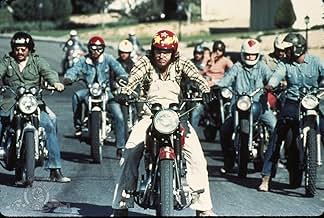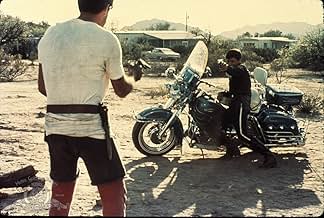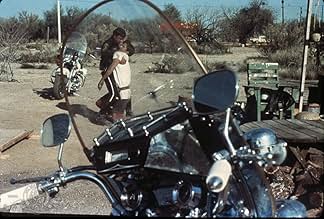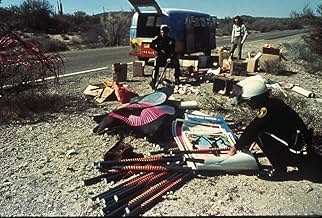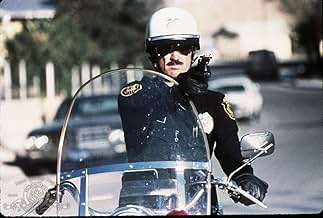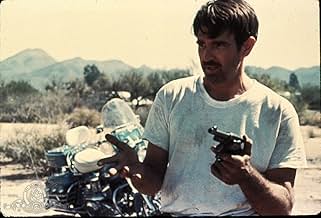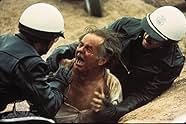VALUTAZIONE IMDb
7,0/10
6916
LA TUA VALUTAZIONE
Aggiungi una trama nella tua linguaA motorcycle cop with a Harley-Davidson ties hippies to a murder in the Arizona desert.A motorcycle cop with a Harley-Davidson ties hippies to a murder in the Arizona desert.A motorcycle cop with a Harley-Davidson ties hippies to a murder in the Arizona desert.
- Regia
- Sceneggiatura
- Star
- Premi
- 3 candidature totali
Billy Green Bush
- Zipper
- (as Billy 'Green' Bush)
Elisha Cook Jr.
- Willie
- (as Elisha Cook)
Hawk Wolinski
- VW Bus Driver
- (as David J. Wolinski)
Melissa Greene
- Zemko's Girlfriend
- (as Melissa Green)
Recensioni in evidenza
An incredible piece of film making, this beautifully shot movie really is about as poetic as it's possible for cinema to be and still have a coherent, gripping narrative. It feels like a western with its dramatic monument valley backdrop and masculine themes, but plays more like a European movie, with it's dark characterisations and existential mood . The soundtrack is fantastic and the feeling the movie imparts is unique. I always recommend this film to people because so few have ever seen it. I think it's a tragedy that James Guercio didn't make more movies because this was his first (and only) film and it's up there with the best of Peckinpah/Leone/Boorman/Seigal (whose work is similar). I'll never forget this film and the ending will live with me forever. If you like movies you need to see this film, This is real Cinema.
Robert Blake has one of the best roles of his career as John Wintergreen, a dedicated motorcycle cop who yearns for more in life. What he'd really like is to be a detective - to wear a suit, a Stetson, and "get paid to think". He gets his chance when he discovers what first appears to be a suicide, but which John determines had to have been a murder. When John shows that he's got what it takes for the detective business, a charismatic hotshot named Harve Poole (Mitch Ryan) takes him under his wing, hiring John as a driver. What happens is that John becomes quite disillusioned watching Harve at work. John strives to be a good, kind, honest man, and doesn't like Harves' approach to law enforcement. A revelation regarding his colleague and good friend "Zipper" (Billy Green Bush) only adds to his dismay.
"Electra Glide in Blue" marked the filmmaking debut for James William Guercio, a veteran of the music industry who, with the help of ace cinematographer Conrad Hall, brings a lot of visual poetry which is not the action-packed murder mystery that some viewers might expect, or hope, it to be. That aspect of this film is never heavily stressed, as the movie clearly functions much more as a series of character vignettes. It's got a very deliberate pace to it, as it gives a number of its major players opportunities to tear into some meaty roles. Blake and Bush have fine chemistry and are quite engaging; you believe them as buddies. Ryan commands the screen whenever he's around; he's an excellent character actor (whom you may know best as the villain in "Lethal Weapon") who gives his role some real nuance. Royal Dano is a little under utilized as a grumpy coroner with whom John butts heads, but Jeannine Riley is wonderful as the barmaid Jolene, and Elisha Cook Jr. is as delightful as ever in the role of sad old sack Willie. Considering Guercios' background, it's not a surprise that some of the supporting players come from the music business - screenwriter Hawk Wolinski as the van driving hippie, and Peter Cetera and Terry Kath from the band Chicago; Cetera, amusingly, plays a scruffy biker. Keep a sharp eye out for Nick Nolte, uncredited as an extra in the commune scene.
The film turns out to be a moving meditation on personal ideals and loneliness, and leads to a shattering conclusion. This conclusion is much in line with films of this time period, and takes its time to play out. It's the kind of thing you don't easily forget.
It's not hard to see why this would have a following. It's interesting and it's entertaining, and well worth a look.
Seven out of 10.
"Electra Glide in Blue" marked the filmmaking debut for James William Guercio, a veteran of the music industry who, with the help of ace cinematographer Conrad Hall, brings a lot of visual poetry which is not the action-packed murder mystery that some viewers might expect, or hope, it to be. That aspect of this film is never heavily stressed, as the movie clearly functions much more as a series of character vignettes. It's got a very deliberate pace to it, as it gives a number of its major players opportunities to tear into some meaty roles. Blake and Bush have fine chemistry and are quite engaging; you believe them as buddies. Ryan commands the screen whenever he's around; he's an excellent character actor (whom you may know best as the villain in "Lethal Weapon") who gives his role some real nuance. Royal Dano is a little under utilized as a grumpy coroner with whom John butts heads, but Jeannine Riley is wonderful as the barmaid Jolene, and Elisha Cook Jr. is as delightful as ever in the role of sad old sack Willie. Considering Guercios' background, it's not a surprise that some of the supporting players come from the music business - screenwriter Hawk Wolinski as the van driving hippie, and Peter Cetera and Terry Kath from the band Chicago; Cetera, amusingly, plays a scruffy biker. Keep a sharp eye out for Nick Nolte, uncredited as an extra in the commune scene.
The film turns out to be a moving meditation on personal ideals and loneliness, and leads to a shattering conclusion. This conclusion is much in line with films of this time period, and takes its time to play out. It's the kind of thing you don't easily forget.
It's not hard to see why this would have a following. It's interesting and it's entertaining, and well worth a look.
Seven out of 10.
Much chat about this film, especially now since it's 'finally' out on DVD in wide screen format.
This is the best film of a specialized genre from the late 60's through early 1970's exploring the counter-culture revolution and the "Establishment".
Unlike Easy Rider, A Clockwork Orange and Billy Jack, EGIB hits the nail on the head. There is evil everywhere, and good intentions don't always result in good outcomes.
Beautiful directorial debut by Guercio, awesome cinematography by Conrad Hall.
In essence, one of the best films from 1973.
This is the best film of a specialized genre from the late 60's through early 1970's exploring the counter-culture revolution and the "Establishment".
Unlike Easy Rider, A Clockwork Orange and Billy Jack, EGIB hits the nail on the head. There is evil everywhere, and good intentions don't always result in good outcomes.
Beautiful directorial debut by Guercio, awesome cinematography by Conrad Hall.
In essence, one of the best films from 1973.
American music producer James William Guercio's one-off dalliance with filmmaking, ELECTRA GLIDE IN BLUE is made when he is only 28-year-old. It stars Robert Blake as a motorcycle cop Johnny Wintergreen who patrols rural Arizona highways and aspires to be a homicidal officer.
The movie opens with a promising panache hardly betrays that Guercio is a greenhorn, conjecturing through its voyeuristic close-ups, audience would soon realize a face-unshown man prepares to kill himself, yet, Guercio's camera also cunningly suggests that he is cooking beef streaks at the same time. Then, boom! He blows himself dead through a shotgun, which unusually aims to his chest rather than the usual easy target, the head, it compellingly sets a paradoxical situation that one immediately knows there is something fishy about the whole act.
Also, before the title card, Guercio takes a tongue-in-cheek tack to introduce our unlikely hero, big Johnny, the camera lurks and swirls in the apartment where Johnny expertly gratifies Jolene (Riley) in bed, before revealing that Johnny is small in stature. When a man's masculinity is stunted by his appearances, it gives audience an idea why he is so eager to achieve something, to compensate the ingrained inferiority complex is a shoo-in. So the apparent-suicidal case becomes his stepping stone to be recruited by detective Harve Poole (Ryan) for his astute observation that it is indeed a murder underneath the hatched facade.
But the ensuing police procedural dampens Johnny's driving enthusiasm, especially after witnessing Harve hectors physically abuses and a group of hippies to milk information about their prime suspect, a drug dealer Bob Zembo (a cameo of Peter Cetera, one of the four CHICAGO members who take on acting roles here apart from their contribution to the picture's soundtrack), and the final straw is an awkward confrontation between him, Harve and Jolene, the latter turns out to be Harve's lover, and spitefully lambastes Harve's incompetence to make her contented and laments her ill-fated destiny, working in a barrelhouse after a dashed Hollywood dream, Johnny and Harv fall out afterwards.
Unambiguously Guercio conducts a half-hearted approach to solve the murder mystery, after trifling with a biker-chasing set piece to keep the action moving, the movie falls back on Johnny's "inner voice" for an expedient epiphany to realize who is the murderer at the end of a MADURA concert, with reasons unexplained, but that is not enough, ultimately there would be another revelation later, to further muddle the water and leave the opening scene ever so ambivalent when one retraces back, before reaching its chilling coda, completely hits viewers like a cold shower, willful but symbolic, overall, it is a loner's world against the canvas of a vast Arizona landscape, everyone in the story is either indolent, disillusioned or corrupt, only the hippies' community stands in as a getaway from the unpleasant reality, but their guarded world is defiant towards the mainstream values, Johnny represents a tragic hero who is doomed because of what he represents, an authority figure, cannot be saved by his amiable personality and all-too-well intentions.
Performance-wise, everyone on board is on a par with excellence, Elisha Cook Jr. is heart-rending to watch in his committed lunacy, Mitchell Ryan expertly imbues a certain degree of passing diffidence in his bombast mannerism and Billy Green Bush is so organic as Johnny's shade- hogging partner and nails his big scene with a flourish, so is Jeannine Riley, manages to steal some limelight even with a role riddled with platitudes. And our leading man Robert Blake, ever so self- reliant as a pipsqueak trying rather hard to chase his dream, only to get short-changed by a cynical world.
ELECTRA GLIDE IN BLUE, also bolstered by a symphonic soundtrack produced by Guercio himself and its striking wide-screen landscape sensation shot by DP Conrad L. Hall, is an astonishing debut feature, if it intends to be more of a zeitgeist-capturer than a gripping detective story, then I must give my whole-hearted congratulations to the crew, mission grandly accomplished!
The movie opens with a promising panache hardly betrays that Guercio is a greenhorn, conjecturing through its voyeuristic close-ups, audience would soon realize a face-unshown man prepares to kill himself, yet, Guercio's camera also cunningly suggests that he is cooking beef streaks at the same time. Then, boom! He blows himself dead through a shotgun, which unusually aims to his chest rather than the usual easy target, the head, it compellingly sets a paradoxical situation that one immediately knows there is something fishy about the whole act.
Also, before the title card, Guercio takes a tongue-in-cheek tack to introduce our unlikely hero, big Johnny, the camera lurks and swirls in the apartment where Johnny expertly gratifies Jolene (Riley) in bed, before revealing that Johnny is small in stature. When a man's masculinity is stunted by his appearances, it gives audience an idea why he is so eager to achieve something, to compensate the ingrained inferiority complex is a shoo-in. So the apparent-suicidal case becomes his stepping stone to be recruited by detective Harve Poole (Ryan) for his astute observation that it is indeed a murder underneath the hatched facade.
But the ensuing police procedural dampens Johnny's driving enthusiasm, especially after witnessing Harve hectors physically abuses and a group of hippies to milk information about their prime suspect, a drug dealer Bob Zembo (a cameo of Peter Cetera, one of the four CHICAGO members who take on acting roles here apart from their contribution to the picture's soundtrack), and the final straw is an awkward confrontation between him, Harve and Jolene, the latter turns out to be Harve's lover, and spitefully lambastes Harve's incompetence to make her contented and laments her ill-fated destiny, working in a barrelhouse after a dashed Hollywood dream, Johnny and Harv fall out afterwards.
Unambiguously Guercio conducts a half-hearted approach to solve the murder mystery, after trifling with a biker-chasing set piece to keep the action moving, the movie falls back on Johnny's "inner voice" for an expedient epiphany to realize who is the murderer at the end of a MADURA concert, with reasons unexplained, but that is not enough, ultimately there would be another revelation later, to further muddle the water and leave the opening scene ever so ambivalent when one retraces back, before reaching its chilling coda, completely hits viewers like a cold shower, willful but symbolic, overall, it is a loner's world against the canvas of a vast Arizona landscape, everyone in the story is either indolent, disillusioned or corrupt, only the hippies' community stands in as a getaway from the unpleasant reality, but their guarded world is defiant towards the mainstream values, Johnny represents a tragic hero who is doomed because of what he represents, an authority figure, cannot be saved by his amiable personality and all-too-well intentions.
Performance-wise, everyone on board is on a par with excellence, Elisha Cook Jr. is heart-rending to watch in his committed lunacy, Mitchell Ryan expertly imbues a certain degree of passing diffidence in his bombast mannerism and Billy Green Bush is so organic as Johnny's shade- hogging partner and nails his big scene with a flourish, so is Jeannine Riley, manages to steal some limelight even with a role riddled with platitudes. And our leading man Robert Blake, ever so self- reliant as a pipsqueak trying rather hard to chase his dream, only to get short-changed by a cynical world.
ELECTRA GLIDE IN BLUE, also bolstered by a symphonic soundtrack produced by Guercio himself and its striking wide-screen landscape sensation shot by DP Conrad L. Hall, is an astonishing debut feature, if it intends to be more of a zeitgeist-capturer than a gripping detective story, then I must give my whole-hearted congratulations to the crew, mission grandly accomplished!
A requiem for the death of the American hero. No, this is not the plot--this is what the movie accomplishes. Do not mistake this existential parable for what may otherwise seem like a superficial counter culture exploitation flick--it is nothing of the sort.
Record producer Guercio's first (and last) effort at filmmaking (captured beautifully by the late cinematographer Conrad Hall) leaves the viewer wondering "where have all the cowboys gone?" John Ford taught us that the hero rode a white horse and did the right thing, even if it killed him-, and in this Vietnam era analogue, Blake is a five foot four inch leather clad motorcycle cop writing speeding tickets along a lonely two lane road cutting through monument valley. With high hopes and ideals, he aspires not only to do more but to become more...and for a while he succeeds. But the world is different, people are different, and the old heroes he admired are not just obsolete--they are extinct.
We are inexorably drawn through his disillusionment and our own to an ending that is sad, tragic, and inevitable.
Record producer Guercio's first (and last) effort at filmmaking (captured beautifully by the late cinematographer Conrad Hall) leaves the viewer wondering "where have all the cowboys gone?" John Ford taught us that the hero rode a white horse and did the right thing, even if it killed him-, and in this Vietnam era analogue, Blake is a five foot four inch leather clad motorcycle cop writing speeding tickets along a lonely two lane road cutting through monument valley. With high hopes and ideals, he aspires not only to do more but to become more...and for a while he succeeds. But the world is different, people are different, and the old heroes he admired are not just obsolete--they are extinct.
We are inexorably drawn through his disillusionment and our own to an ending that is sad, tragic, and inevitable.
Lo sapevi?
- QuizAccording to James William Guercio's DVD commentary, the majority of the movie was filmed without government permits because the Arizona State Police did not want to co-operate with the production of the film.
- BlooperIn the final driving scenes, the van and the bike, supposedly driving along a long straight road, drive by the same distant butte at least three times.
- Citazioni
Harve Poole: Incompetence is the worst form of corruption.
- Versioni alternativeJohn Wintergreen is called John Winterberg in the German version.
- ConnessioniEdited into The Our Gang Story (1994)
I più visti
Accedi per valutare e creare un elenco di titoli salvati per ottenere consigli personalizzati
- How long is Electra Glide in Blue?Powered by Alexa
Dettagli
Botteghino
- Lordo Stati Uniti e Canada
- 1.600.000 USD
- Tempo di esecuzione
- 1h 54min(114 min)
- Colore
- Mix di suoni
- Proporzioni
- 2.39 : 1
Contribuisci a questa pagina
Suggerisci una modifica o aggiungi i contenuti mancanti


